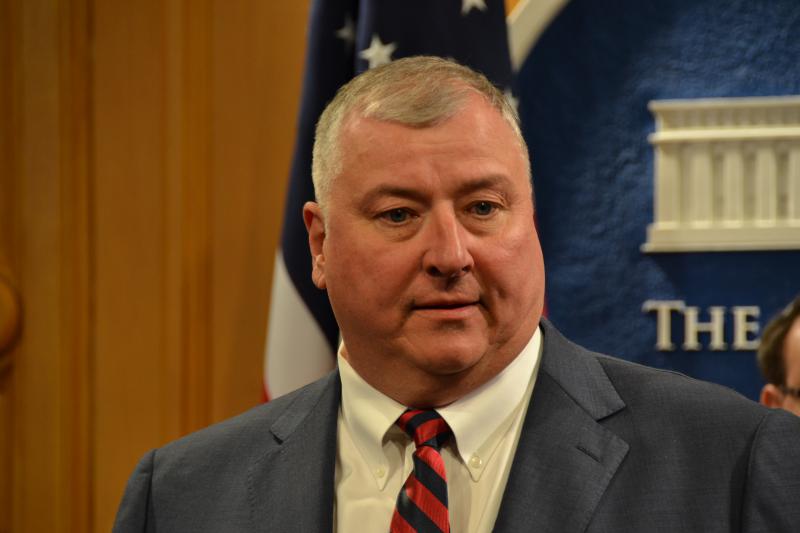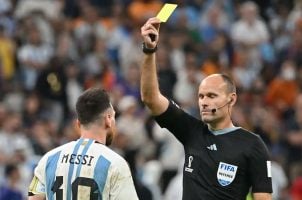Racketeering Charge Against Ohio House Speaker Could Impact Chances for Sports Betting Bill
Posted on: July 21, 2020, 05:30h.
Last updated on: July 22, 2020, 12:38h.
Larry Householder (R-Glenford) — the Ohio Speaker of the House — was one of five people arrested early Tuesday by federal authorities in connection with a $60 million racketeering and bribery scheme. The plot allegedly centered around an effort to pass a bailout for two nuclear power plants in the state.

By Tuesday afternoon, Householder — a proponent of a sports betting bill that passed his chamber in late May — faced calls to resign from several state leaders, including Gov. Mike DeWine (R) and state Senate President Larry Obhof (R-Medina).
In a news release from the US Attorney’s Office, authorities allege Householder and the others arrested worked to defeat a ballot initiative to overturn a $1 billion plan to keep the nuclear power plants from closing. The individuals received $60 million from a nonprofit special interest group called Generation Now, which was also charged in the case.
Householder ran the group, prosecutors claim, and he received $250,000 payments every quarter from energy companies starting in March 2017. Those charged in the case used funds to support House members and candidates who would support Householder’s effort to become House Speaker last year by running ads against their opponents.
Those who won the election voted for Householder as speaker.
The speaker also got more than $400,000 in funds for his own benefit. That money went to settle a lawsuit, pay for his Florida home, and clear credit card debts.
All forms of public corruption are unacceptable,” FBI Cincinnati Special Agent in Charge Chris Hoffman said in a statement. “When the corruption is alleged to reach some of the highest levels of our state government, the citizens of Ohio should be shocked and appalled.”
Householder faces up to 20 years in prison.
Lobbyists, Not Gaming Company, Implicated
The others charged in the case are lobbyist and former Ohio Republican Party Chairman Mathew Borges, Householder campaign strategist Jeffrey Longstreth, lobbyist Juan Cespedes, and lobbyist Neil Clark.
Clark — who previously served as the budget director for the state House Republican Caucus — represents such clients in Columbus as the Fair Gaming Coalition of Ohio, which seeks to promote legal coin-operated games in the state, and Intralot USA, which is a contractor for the state lottery.
The global gaming company serves as the Ohio Lottery’s “major gaming vendor,” according to the lottery’s website.
Neither the US Attorney’s statement nor the complaint in federal court mentions or implicates Intralot. However, the case at least throws some uncertainty about the prospects of House Bill 194 moving forward during the session, which runs through the end of the calendar year.
That bill, which passed by an 83-10 vote on May 28, calls for the state lottery to manage sports betting. Householder supported the bill, sponsored by state Reps. Dave Greenspan (R-Westlake) and Brigid Kelly (D-Cincinnati), saying he believed the state’s constitution called for the lottery to regulate sports wagering.
Intralot currently provides sports betting solutions for lotteries in Oregon, the District of Columbia, and Montana.
A message to Greenspan was not returned by Tuesday afternoon.
Senators Propose Sports Betting Bill
While HB194 is now in the state Senate, that body is also discussing its own sports betting bill that does not involve the state lottery.
Senate Bill 111 calls for the state’s Casino Control Commission to regulate the activity. The Senate bill has a lower tax rate, 6.75 percent, compared to the House’s 10 percent. That bill, however, has not received a hearing since last year.
Lawmakers from both chambers have said they’re willing to work with each other to hammer out a bill that would pass both chambers.
Related News Articles
Conor McGregor Wants Floyd Mayweather Boxing Rematch, Says ‘Going to Happen’
Northern Arapaho Tribe Pushing Ahead with Wyoming Sports Betting Effort
FIFA World Cup: ‘Useless’ Spanish Referee Ejected, Sent Packing
Most Popular
LOST VEGAS: ‘Tony The Ant’ Spilotro’s Circus Circus Gift Shop
Las Vegas Overstated F1 Race’s Vegas Impact — Report
Mega Millions Reportedly Mulling Substantial Ticket Price Increase
Las Vegas Strip Stabbing Near The Strat Leaves One Man Dead
Most Commented
-
End of the Line for Las Vegas Monorail
— April 5, 2024 — 90 Comments -
Mega Millions Reportedly Mulling Substantial Ticket Price Increase
— April 16, 2024 — 8 Comments -
Long Island Casino Opponents Love New York Licensing Delays
— March 27, 2024 — 5 Comments
















No comments yet